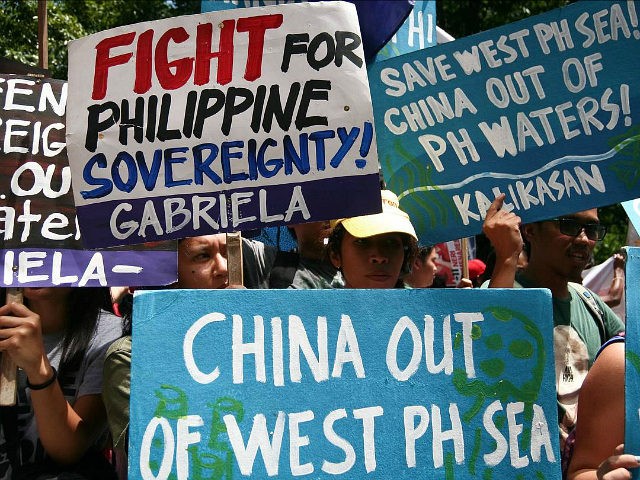A poll released Friday shows that over four in five Philippine nationals support confronting China over their colonization of Philippine territory in the South China Sea, just as the administration of President Rodrigo Duterte announced it would honor an agreement to expand America’s military footprint in the country.
Duterte has previously rejected the use of any confrontational tactics against China in the region, arguing that Manila could not afford a war against the massive People’s Liberation Army.
The polling firm Pulse Asia found 84 percent of respondents supported the government acting to “uphold its rights in the disputed waters” of the South China Sea, which include territories in the Spratly and Paracel Island chain and the Scarborough Shoal. Three percent of those polled said they do not agree with the government calling for China to respect its loss at the Permanent Court of Arbitration at the Hague, which found the Philippines’s claims to be legitimate and dismissed China’s.
The poll also found that Filipinos trust the United States above all other foreign countries, despite President Duterte’s repeated calls for a rift with the United States and closer ties to China and Russia. 76 percent of those polled said they trust the United States more than any other country. Second-most trusted on the list was China’s most prominent regional rival, Japan. 70 percent of those polled said they trusted Japan.
While Duterte has repeatedly called for closer ties with China, he has also cultivated a friendship with Japanese Prime Minister Shinzo Abe, who became the first head of state to visit Duterte in the Philippines earlier this month. Abe stayed in Duterte’s home in southern Davao City where Duterte served as mayor for 22 years.
The government of Duterte’s predecessor, Benigno Aquino, was extremely active in challenging China’s claims in the South China Sea, having filed the case against Beijing at the Hague. During his tenure, Philippine activists staged visits to the islands in question, raising the Philippine flag and demanding the government act to not allow China to colonize its territory.
Duterte has taken a much more subdued tact to the struggle. “We will not join any expedition or patrolling the sea. I will not allow it because I do not want my country to be in involved in a hostile act,” Duterte said in September, announcing his withdrawal of Coast Guard patrols from disputed waters. Duterte later said he would wish to join a “new order” globally with China and Russia and give up ties to the United States and abandoning the United Nations entirely.
The Supreme Court of the Philippines has warned Duterte that he has a constitutional duty to protect the sovereignty of the United States and would be subject to impeachment if he allowed China to take the Scarborough Shoal, longtime Philippine fishing waters.
For his trouble, China has agreed to help Duterte fund his war on drugs. In December, the Chinese government announced it would invest over $14 million in new police equipment for Manila. “I think we can get some small arms, a number of fast boats, and some night vision goggle,” Defense Secretary Delfin Lorenzana said of the aid package.
Duterte has not, however, abandoned the United States as definitively as he claimed when he issued a “goodbye” statement in October. Lorenzana announced this week that the Philippines would allow the United States to complete several new military construction projects within its borders. The development is the product of a 2014 agreement known as the Enhanced Defence Co-operation Agreement (EDCA).
“EDCA is still on and according to the Pentagon, they will start constructing some facilties in the EDCA chosen camps,” Lorenzana said Thurday. The project would consist in the construction of five new facilities, including three military bases, and would allow the deployment of “ships, aircraft and troops at those bases.” U.S. soldiers would also be able to participate in humanitarian missions based from those locations.

COMMENTS
Please let us know if you're having issues with commenting.